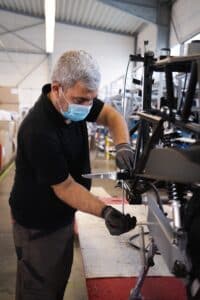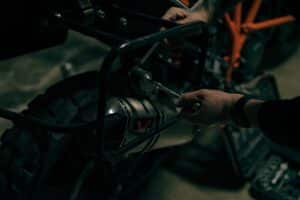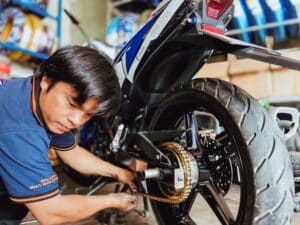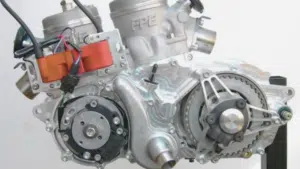If you’re passionate about motorcycles and have a knack for fixing things, then a career as a motorcycle mechanic might be the perfect fit for you. Motorcycle mechanics are responsible for diagnosing and repairing motorcycles, playing a crucial role in keeping riders safe on the road. This guide will take you through the steps to become a skilled motorcycle mechanic.
Education and Training
When embarking on your journey to become a motorcycle mechanic, education and training are pivotal. While a high school diploma or GED is typically the minimum education requirement for a motorcycle mechanic position, many employers prefer candidates with formal training. Accredited motorcycle mechanic training programs are available at technical schools, community colleges, and even online. These programs last one to two years and cover all aspects of motorcycle repair, from basic maintenance to complex engine overhauls.
Gaining a solid educational foundation will not only provide you with the necessary theoretical knowledge but also hands-on experience, ensuring you are well-prepared for the challenges of the job. During your training, you will learn to work with various motorcycle types, engines, and systems, giving you a broad skill set to excel in the field. Additionally, online motorcycle mechanic training programs offer flexible options for those who may not have access to traditional classroom settings.
Gain Experience
Beyond formal education, hands-on experience is a vital stepping stone in your journey to becoming a proficient motorcycle mechanic. While classroom learning provides the theoretical framework, practical application is where you truly hone your skills. You can gain this experience by volunteering at a motorcycle shop, interning with an experienced mechanic, or by working on your motorcycles.
Working alongside experienced mechanics allows you to witness real-world problem-solving, understand customer interactions, and refine your diagnostic abilities. Whether it’s diagnosing an electrical issue, fine-tuning an engine, or performing routine maintenance, practical experience is invaluable in building your confidence and competence as a motorcycle mechanic.
Certification
Although certification is not legally required, it can significantly enhance your job prospects and establish your credibility as a motorcycle mechanic. Several motorcycle mechanic certification programs exist, such as those offered by the Motorcycle Mechanics Institute (MMI) and the National Institute for Automotive Service Excellence (ASE). Certification demonstrates your commitment to professionalism and expertise in the field, setting you apart from non-certified applicants.
Obtaining certification involves passing rigorous exams that evaluate your knowledge and skills in motorcycle repair and maintenance. It’s a valuable investment in your career, as it not only opens doors to more job opportunities but also fosters trust with customers who seek qualified mechanics for their prized possessions.
Skill Development
The motorcycle mechanics field is continually evolving with new technologies and repair techniques. Staying up-to-date is crucial to remain competitive and offer the best service to your customers. Attend industry trade shows and conferences to learn about the latest advancements in motorcycle technology. Consider taking online courses to expand your knowledge further. Additionally, regularly reading motorcycle industry publications will keep you informed about the latest trends and innovations, ensuring that you are well-equipped to handle any challenge that comes your way.
Mechanic Tool Sets and Equipment
Investing in high-quality mechanic tool sets and equipment is essential for any aspiring motorcycle mechanic. These tools are your lifeline in diagnosing and repairing motorcycles efficiently and safely. Ensure your toolkit includes a wide range of tools, including socket sets, wrenches, pliers, screwdrivers, and torque wrenches. Additionally, specialized tools for motorcycle maintenance, such as chain breakers and valve adjustment tools, should be part of your arsenal.
Regularly inspect and maintain your tools to ensure they remain in top condition. Properly functioning tools not only make your job easier but also contribute to the quality of your work.
Motorcycle Repair Manuals and Guides
In your journey to becoming a motorcycle mechanic, repair manuals and guides will be your trusted companions. These resources provide step-by-step instructions, diagrams, and specifications for various motorcycle models. Repair manuals are available for specific brands and models, making them invaluable when troubleshooting and conducting repairs.
Always keep a library of motorcycle repair manuals and guides relevant to the bikes you commonly work on. These references will assist you in diagnosing issues, performing maintenance tasks, and ensuring that your repairs adhere to manufacturer specifications.
Customer Service Skills
In addition to technical prowess, motorcycle mechanics must excel in customer service. You will often interact directly with customers, explaining repairs in a clear and concise manner and addressing their needs and concerns. Building trust with your clients will lead to repeat business and a strong reputation in the industry. Remember, it’s not just about fixing motorcycles; it’s about creating satisfied and loyal customers who feel safe and confident on the open road.
Tips for Success
Networking: Connect with other motorcycle mechanics. Networking can help you discover job opportunities and gain valuable insights from experienced professionals.
Join a Motorcycle Club or Association: Being part of a motorcycle club or association can introduce you to fellow enthusiasts and provide opportunities to learn more about the industry.
Maintain Your Tools and Equipment: Efficient and safe job performance depends on well-maintained tools and equipment. Regularly inspect and service your tools to ensure they remain in top condition.
Ethical Conduct: Building a good reputation by being honest and ethical in your dealings with customers is essential for long-term success. Word-of-mouth recommendations and positive reviews can significantly impact your career.
Conclusion
Becoming a motorcycle mechanic is a fulfilling journey that demands dedication and continuous learning. By following these steps, gaining experience, and staying current in the field, you’ll be well-prepared for a successful career in motorcycle mechanics. Remember, it’s not just about fixing bikes; it’s about keeping riders safe and on the open road. Whether you’re diagnosing complex engine issues or providing routine maintenance, your expertise will be essential in ensuring that motorcycle enthusiasts can enjoy their passion safely and confidently.











